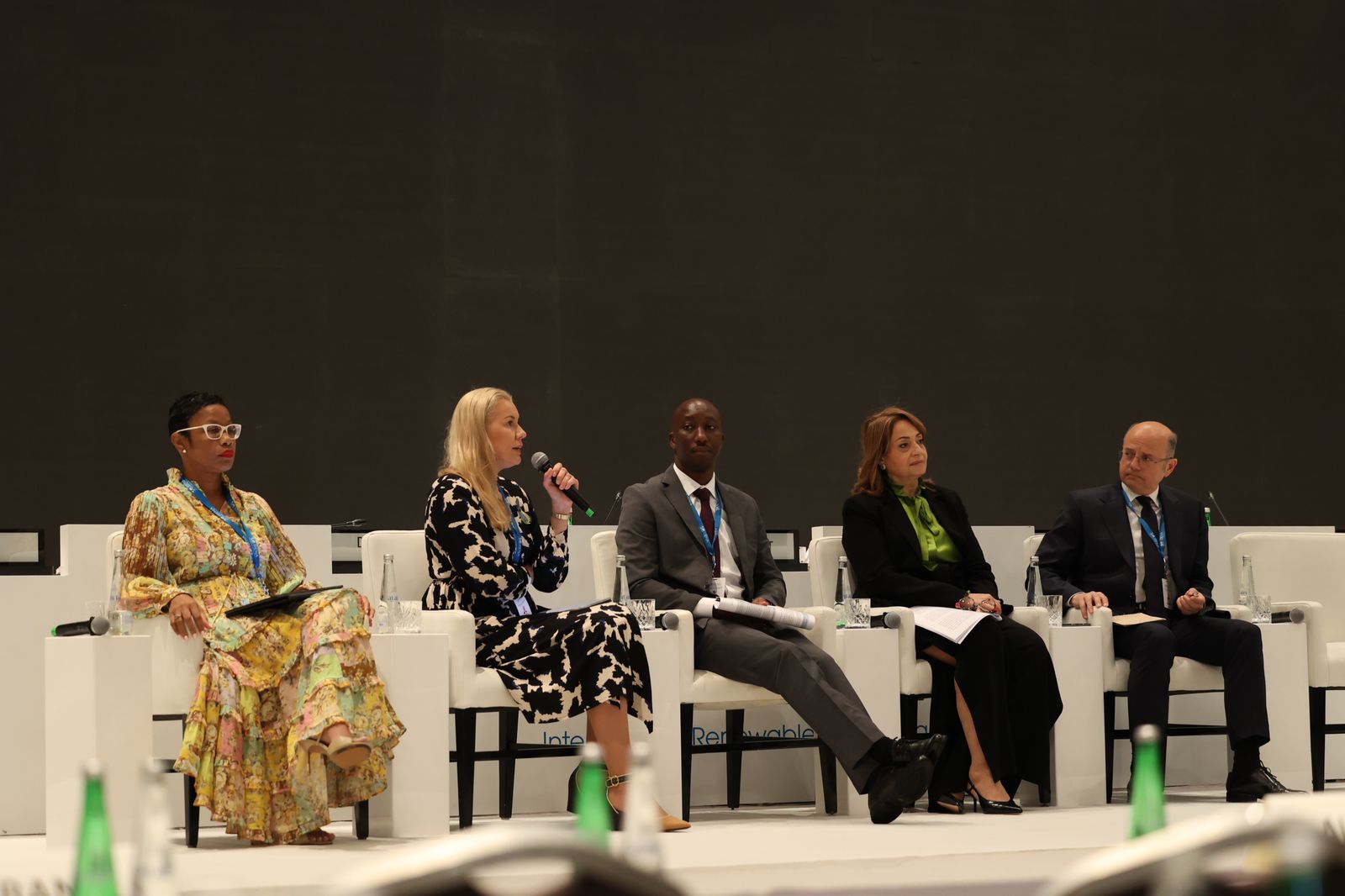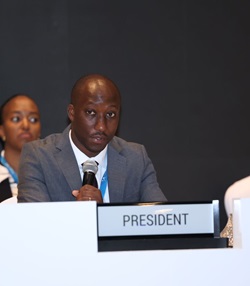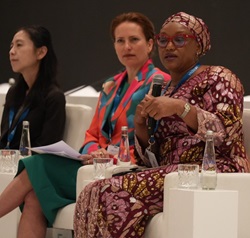
IRENA 14A: Assembly Live Coverage
Welcome to the Fourteen session of IRENA Assembly Live. Follow this page for live blog and live streaming from the Assembly, 16-17 April, and check IRENA social media channels for updates on #IRENA14A.
The sessions will be live-streamed on this webpage, all recordings can be accessed below.
Watch the Press Conference
Watch the IRENA 14A: Resumption of the session and High-Level Plenary on Tripling of Renewables below:
IRENA Fourteenth Assembly is now officially resumed. H.E. Mr Jimmy Gasore, President of the 14th IRENA Assembly and Minster of Infrastructure, Rwanda, opened the meeting delivering brief remarks, saying "COP28 brought as historic progress through the UAE Consensus (...) including the call to triple renewables and double energy efficiency by 2030." He continued his remarks reminding the attendees that the IRENA latest brief on Tracking COP28 Outcomes outlined that the added annual renewable capacity in 2023 was record high, yet far from what is necessary.
H.E. Mr Bhupinder Bhalla, Secretary of Ministry of New and Renewable Energy delivered the opening remarks on behalf of H.E. Mr Raj Kumar Singh, Cabinet Minister for Power and New and Renewable Energy, IRENA's 13th Assembly President, confirming India's commitment to just and inclusive energy transition.
IRENA Director-General, Francesco La Camera, concluded his opening remarks underlining that "We are entering a new era of change, one in which the energy transition will drive economic transformation. This change is bringing unprecedented new opportunities that can revitalize economies and lift people out of poverty". He continued saying how the energy transition are central in today’s decision-making and with real impact on everyday lives. "Looking ahead, we know there will be challenges. Some we can anticipate. Others we cannot. But so long as we remain on the path of innovation, collaboration, and determination, we can reach a renewables-based energy future that will underpin a sustainable and more equitable world", he concluded.
In his opening remarks @IRENA DG @flacamera stressed the geographical disparities in renewable energy deployment & said, "We need to be focused & united in advancing solutions we have at the necessary speed & scale to set the stage for post 2030 action." pic.twitter.com/fJYO4rdmkv
— IRENA (@IRENA) April 17, 2024
Antonio Guterres, Secretary-General of the United Nations deleivered his opening remarks saying “Our collective future depends on collective action,” when commenting on the global commitment and action needed for the further adoption of renewable energy. “The renewables revolution is unstoppable, and the phase-out of fossil fuels is inevitable. Our task is to ensure that the transition is fast enough and fair enough to limit the rise of 1.5° and bring the benefits of clean power by 2030," he continued, concluding "Our collective future depends on collective action that makes the work of IRENA critical".
High-Level Plenary on Tripling of Renewables
The high-level session has commenced now with an aim to pinpoint specific, immediate steps to actualise the COP 28 outcomes. The forthcoming discussions will explore how to optimise international cooperation to achieve tripling renewable power capacity by 2030, effectively monitor progress and course correct towards tripling renewable energy capacity targets.
This discussion will be moderated by Becky Anderson, CNN.
As moderator of the session, Becky Anderson reminded everyone that there is a huge gap between the Global North and the Global South in progress towards meeting the renewables target. She said, "IRENA plays a role in tracking this progress, confirming that the world is off track. So here we are, gathered to explore the challenges and opportunities to make sure the transition is back on track."
In the first intervention during this panel discussion, Kadri Simson, Commissioner for Energy, EU, says that while COP28 was a success, the focus now should be on implementation: "It is all about implementation. 2030 is only six years away, " she said. “COP29 should prioritise renewables and address financing challenges to replace fossil fuels. The EU has significantly raised its renewable targets and is planning beyond 2030. Public funds are insufficient, necessitating improved access to private financing. EU member states are showing great ambition in reducing dependence on fossil fuels, with investments now focused on improving transmission and distribution grids." she underlines. She noted that efforts need to be taken on a more global scale, “The challenge is that public funds are not enough. So, we have to address the issue of how private finance will be accessible to the remaining world," she concluded.

H.E. Dr Amani Abou-Zeid, Commissioner for Infrastructure and Energy, African Union engaged in the panel discussion talking about the renewable energy trends in Africa. Africa's emissions are 3% of global emissions, she underlined, saying that the continent is a home to the largest solar farms. She stated that "Africa is a world leader when it comes to renewables, (...) but is still suffering from serious energy poverty. More than half of our population has no electricity access and 90% of our population do not have access to clean cooking. (...) Africa is endowed with huge potential of renewables,' she concluded. The moderator, Becky Anderson, followed up asking "So what is missing?" the answer is infrastructure and lack of investment. What the world needs is the universal access to electricity and action to achieve it, was the final conclusion of this intervention.
Lisa Cummins, Minister of Energy and Business, Barbados, says that financing should be fit for purpose for developing countries to enable them meet their energy transition targets. “We are in discussions and are already winessing financing pledges, but the problem is the terms and conditions that come with most capital. If the cost of capital is high, it will certainly affect consumer prices, making electricity unfordable for developing countries. So, financing must be fit for purpose for SIDS and other developing countries.
The discussion continues. "We are rapidly developing our renewable sources of energy in Azerbaijan, getting some results by doubling by 2027 and tripling by 2030. The realisation of this plan needs financial support and investment,” says H.E. Mr Parviz Shahbazov, Minister of Energy, Azerbaijan, on the progress made in Azerbaijan while emphasising the need for further cooperation and accessible financing to meet national, regional and global renewables targets.
Dr Amani Abou-Zeid, Commissioner for Infrastructure and Energy, African Union, says that Africa is focusing on doubling energy efficiency and developing the African Energy Information System to address grid wastage of 30-40%. “Upgrading grids can increase energy access by up to 40%. To succeed, we must address both supply and demand. With 65% of Africa's population being young, prioritising energy access is vital for global competitiveness. We are committed to improving the investment climate to achieve these goals.” Continuing her intervention on the needs to accelerate energy transition and develop the relevant infrastructure, she said ""This is an existential crisis. This is something we don't get a chance to redo. We absolutely have to do it and we have to do it now".
“There should be a monitoring framework that allows us to follow what is happening since 132 countries agreed to triple renewables and double energy,” says H.E. Ms Kadri Simson, Commissioner for Energy, EU, on the need for reporting and transparency in the green transition to track the progress made by the global community.
“In Rwanda, we have created the Rwanda Green Fund, which is tapping into the various financial mechanisms to support Rwanda’s green growth. If we can replicate this infrastructure across Africa, it could become the primary funding source for policies, capacity-building, and investments. This fund isn't just philanthropy, it is a business opportunity in renewables,” says Jimmy Gasore, the new President of the 14th IRENA Assembly.
“We are done with strategies, ideas, processes and decisions. It is only time for implementation,” says H.E. Ms Kadri Simson, Commissioner for Energy, EU, on what is needed for the upcoming COP29, with the first panel, focused on national and regional perspectives, is coming to a close.
The panel discussion concludes with a moderator's call for increased financial commitments to address immediate needs. Realigning institutional capabilities will be crucial in accelerating progress effectively.
The second panel focused on implementation is now in progress, Becky Anderson is moderating the discussion on key priorities and actions needed.
At the start of the discussion, Mr. Jose Manuel Entrecanales, CEO, Acciona says “We tend to forget the overwhelming element that moves private capital, which is the risk-reward equation,” highlighting what governments need to do to foster a better financial environment to foster private sector investment. He highlighted the need for capital attraction through regulatory changes in order to increase the adoption of renewable energy.
“Energy storage has become even more crucial,” says Ms Dany Qian, Global Vice President of Jinko Solar Global, on the need for energy storage technology to ensure universal access to clean energy for hard-to-reach regions. She added, “Governments should promote the uptake of advanced storage technologies providing a clear signal to investors and industry players to drive the necessary scale up and remove necessary barriers to towards implementation and cooperation,” when commenting on what governments should focus accelerate the scale-up of renewable energy.
“There are a lot of integrated issues that we can build upon and improve to really help countries to amplify their job sector, their local community needs, and their benefits to really bring more value to the supply chains sector, says Ms. Julia Souder, CEO, Long Duration Energy Storage Council and Chair of the Global Renewables Alliance on the impact that private-public partnership can have to expand the adoption of renewables, increase access and transform communities.
Becky Anderson closed the panel by recapping the need for concrete action in the implementation of climate financing and cooperation between governments and the private sector to meet tripling targets.
Member Interventions have commenced now. Watch the live stream above to follow the live coverage from this session.
EIN Presswire does not exercise editorial control over third-party content provided, uploaded, published, or distributed by users of EIN Presswire. We are a distributor, not a publisher, of 3rd party content. Such content may contain the views, opinions, statements, offers, and other material of the respective users, suppliers, participants, or authors.



